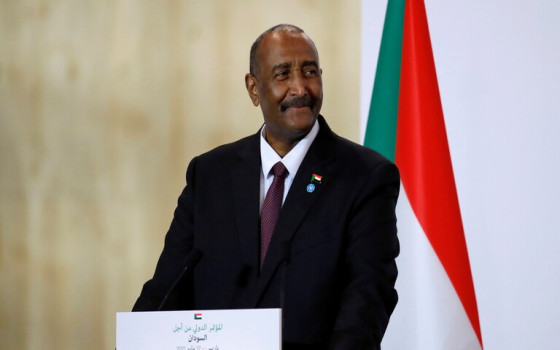
عبد الفتاح البرهان يدعو إلى تصنيف قوات الدعم السريع، مجموعة إرهابية

- Europe and Arabs
- الجمعة , 22 سبتمبر 2023 15:31 م GMT
نيويورك : اوروبا والعرب
طالب عبد الفتاح البرهان رئيس مجلس السيادة الانتقالي في السودان، الأمم المتحدة والمجتمع الدولي باعتبار قوات الدعم السريع والميليشيات المتحالفة معها، "مجموعات إرهابية لحماية الشعب السوداني والمنطقة والعالم". بحسب مانقلت نشرة الاخبار اليومية للامم المتحدة وتلقينا نسخة منها صباح الجمعه
وفي كلمة بلاده أمام المناقشة العامة للجمعية العامة للأمم المتحدة، قال البرهان إن الشعب يواجه حربا مدمرة منذ الخامس عشر من نيسان/أبريل شنتها عليه قوات الدعم السريع التي وصفها بالمتمردة بالتحالف مع "ميليشيات قبلية وأخرى إقليمية ودولية ومرتزقة من مختلف أنحاء العالم".
وقال إنها ارتكبت "جرائم ضد الإنسانية وجرائم حرب في معظم أنحاء السودان ومارست التطهير العرقي والعنف الجنسي". وأضاف أن الجرائم التي حدثت في مناطق مثل الجنينة في غرب دارفور تمثل صدمة للضمير العالمي حسب تعبيره.
وأكد بذل كل السبل لإيقاف الحرب عبر الاستجابة لكل المبادرات، وأشار إلى اجتماعات جدة بدعوة من المملكة العربية السعودية والولايات المتحدة الأمريكية. وقال إنه تم تحقيق تقدم جيد في تلك الاجتماعات لولا ما وصفه بتعنت المتمردين ورفضهم الخروج من الأحياء السكنية.
وتحدث عن قبول مبادرة الإيقاد، ومبادرة دول الجوار التي عقدت في مصر. وقال إنه ما زال "حتى اليوم يمد يده من أجل السلام وإيقاف الحرب ورفع المعاناة عن الشعب". واتهم قوات الدعم السريع برفض الحلول السلمية والإصرار على تدمير الدولة.
ورفض وصف الحرب بأنها داخلية بين طرفين مسلحين. وقال إن الاعتداء لم يتوقف عند القوات المسلحة بل شمل كل مقومات ومكونات الدولة، وأضاف: "المواطنون الأبرياء ليسوا جزءا من القوات المسلحة. والمساليت في غرب دارفور ليسوا جزءا من القوات المسلحة".
وقال إن هذه الحرب أصبحت تهدد السلم والأمن الإقليميين والدوليين لاستعانة "المتمردين بمجموعات خارجة عن القانون وإرهابية".
وأعرب عن تقديره لجهود الأمم المتحدة، برعاية الأمين العام، لدعم الوضع الإنساني في السودان، وجهود وكالات الأمم المتحدة المختلفة والوكالات الدولية والإقليمية الأخرى.
وناشد الوكالات والدول بالإيفاء بتعهداتها لسد الفجوة الكبيرة في الغذاء والدواء والإيواء لقطاعات واسعة من الشعب السوداني تضررت من الحرب.
وأكد التزامه بالتعهدات السابقة بنقل السلطة إلى الشعب السوداني "بتوافق عريض وتراض وطني، تخرج بموجبه القوات المسلحة نهائيا من العمل السياسي ويكون تداول السلطة بالطرق الشرعية والسلمية المتمثلة في الانتخابات".
وقال "نرى أن تكون هناك مرحلة انتقالية قصيرة تدار فيها الدولة من قبل حكومة مدنية من المستقلين تتم خلالها معالجة الأوضاع الأمنية والإنسانية والاقتصادية الراهنة وإعادة الإعمار، تعقبها انتخابات عامة يختار من خلالها السودانيون من يحكمهم".
وفي سياق تأكيده على التزام الدولة بتحقيق التنمية المستدامة، ذكر أن وقف وتجميد المساعدات الدولية في الفترة السابقة قد أثر سلبا على تحقيق التنمية والحماية الاجتماعية ومواجهة التغيرات المناخية وأزمة الغذاء وفاقم أوضاع اللاجئين والنازحين.
وناشد المانحين ووكالات الإغاثة المختلفة الاستمرار في دعم ومعالجة الأوضاع الإنسانية في السودان ومساعدة المحتاجين.












لا يوجد تعليقات